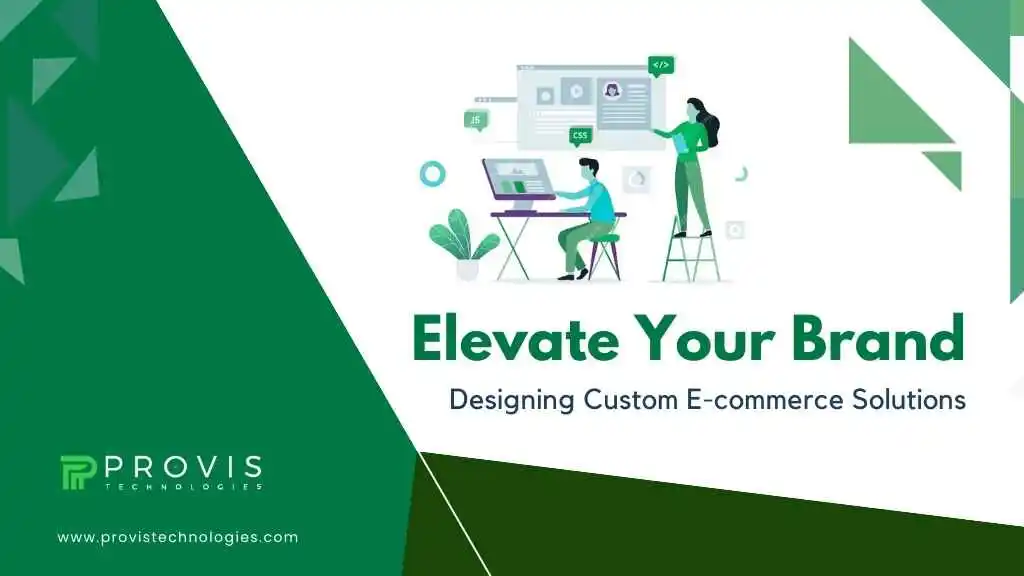In the fiercely competitive e-commerce market, standing out from the crowd requires more than a standard approach. Elevating your brand and capturing customer attention through customization is essential. Let’s explore the importance of custom e-commerce solutions tailored to your unique business needs and delve into the secret of success.
Ways to Get Custom E-commerce Solutions
Understanding Your Business Needs

Before embarking on the journey of designing custom e-commerce solutions, it’s crucial to gain a deep understanding of your business needs, goals, and target audience. Conduct thorough market research, analyze competitor strategies, and identify pain points & opportunities within your industry for the design & development process.
Read More: Android vs iOS Which is the Best Platform for App Development?
Tailoring the User Experience

Custom e-commerce solutions allow you to create a personalized and intuitive user experience that reflects your brand identity & values. From the website layout & design to the navigation & checkout process, every aspect of the user journey should be carefully crafted to delight. Engage customers to drive conversions.
Must More: Why is 2024 a Great Year to Start Your E-commerce?
Integrating Advanced Features & Functionality

One of the primary benefits of custom e-commerce solutions is the ability to integrate advanced features & functionality that meet the specific requirements of your business. Whether it’s about implementing a custom product configurator, building a subscription-based model, or integrating with third-party APIs – these solutions enable you to offer unique and innovative experiences that set your brand apart from the competition.
Must Read: The Future of E-commerce: Embracing SaaS Solutions
Optimizing for Performance & Scalability

Performance & scalability are critical considerations when designing custom e-commerce solutions, especially as your business grows. Ensure your website is optimized for speed with faster loading times and smooth functionality. Moreover, invest in scalable infrastructure and technologies that accommodate increased traffic, transactions, and data volume without compromising performance.
Read More: 10 Essential Tips for Launching Your E-commerce Journey with WooCommerce
Enhancing Security & Compliance

Protecting sensitive customer data and ensuring compliance with industry regulations are essential in e-commerce. Custom solutions enable you to implement robust security measures, such as encryption, firewalls, and secure payment gateways – to safeguard against cyber threats. Also, ensure your e-commerce platform complies with relevant regulations, such as GDPR or PCI DSS, to maintain trust & credibility with your customers.
Read More: A Step-by-Step Guide to Website Optimization Strategies for 2024
Leveraging Data Analytics & Insights

Custom e-commerce solutions provide the opportunity to leverage data analytics & insights to drive informed decision-making and optimize business performance. Implement tracking tools to monitor metrics, website traffic, conversion rates, and customer behavior – and use this data to identify trends, refine strategies, and personalize the customer experience further.
Read More: Mastering E-commerce Expert Tips for Seamless Development
Continuous Testing & Optimization

The journey of designing custom e-commerce solutions doesn’t end once the website is launched. It’s essential to continuously test and optimize your platform to ensure optimal performance. Conduct A/B testing, gather user feedback, and iterate your design based on insights to keep your e-commerce solution competitive.
Must See: The Future of E-commerce: Embracing SaaS Solutions
Investing in Support & Maintenance

Finally, investing in ongoing support & maintenance is crucial to the long-term success of your custom e-commerce solution. Regularly update your website with new features and security patches. Provide responsive customer support, and stay abreast of emerging technologies to remain agile in the ever-changing e-commerce domain.
Read More: E-commerce Evolution: Trends & Technologies Shaping the Industry
Bottom Line
By embracing the power of e-commerce solutions and focusing on user experience, performance, security, and innovation. You can elevate your brand and create a competitive edge that resonates with customers and drives sustainable growth.
FAQs
Yes! e-commerce solutions are tailored to your specific business needs, offering personalized user experiences, advanced features, and scalability that can elevate your brand and drive growth.
e-commerce solutions allow for the integration of advanced features such as custom product configurators, subscription-based models, third-party API integrations, and personalized marketing automation tools – offering unique and innovative experiences for your customers.
To ensure the security of your custom e-commerce solution, implement robust security measures such as encryption, secure payment gateways, and compliance with industry regulations such as GDPR or PCI DSS – to protect sensitive customer data and maintain trust and credibility with your audience.
Data analytics enables you to gather insights into customer behavior, monitor key metrics, and optimize business performance – empowering informed decision-making and personalized user experiences that drive conversion and retention.
Yes! Investing in ongoing support & maintenance is essential to the long-term success of your custom e-commerce solution. Regular updates, security patches, and responsive customer support ensure optimal performance, usability, and agility in the ever-evolving e-commerce landscape.
Custom e-commerce solutions are designed from scratch to meet the unique requirements of your business to offer greater flexibility, customization, and innovation compared to pre-built platforms, which may have limitations in functionality & scalability.
Written By
Author's Picks
- Elevating E-commerce with Mobile App Development | A Comprehensive Guide to E-commerce Apps Development
- 10/04/2024
- The Future of E-commerce: Embracing SaaS Solutions
- 15/04/2024
- Prototype vs MVP: Which One Do You Need in 2025?
- 25/12/2024
Categories
- AI for Startups
- AI in Web Development
- AI Integration
- AI Platforms
- AI Prompt
- AI Tools
- AI Trading Software
- Android App
- Android vs iOS Development
- Angular
- API
- API Development
- App
- app development
- App Idea
- App User Feedback
- Application
- Artificial Intelligence
- Audit Services
- Automotive Industry
- Awards and Recognition
- Business Consulting
- Business Website
- Chatbots
- CRM
- CRM for Financial Advisors
- Custom CRM
- Custom SaaS
- Custom Website
- Customer Service
- dashboard design
- Developing a Mobile App
- Digital Business
- E-commerce
- EMR Integration
- Finance
- Financial Advisors
- Financial Advisors
- GIT
- Health Insurance
- iOS App
- iOS App Development
- IoT Mobile App Development
- IoT Platforms
- IT Audit Services
- IT Consulting
- IT Strategies
- Java Development
- Laravel
- Lean Canvas
- Learning Management System
- Logistics Apps
- Mobile App Development
- MVP
- Native App
- News Aggregator Site
- OTT
- Outsourcing IT
- Payment Gateway
- predictive analysis
- Product Launch Strategy
- Progressive Web App (PWA)
- Prototype
- Recommender Systems
- Ruby
- SaaS
- SaaS Application
- SaaS Business
- SaaS Company
- SaaS Development
- SaaS Product
- SaaS Project
- Sales Funnel
- SEO
- Shopping Cart
- Software Development
- SSL and TLS
- Startup Checklist
- Technology
- Tetradic Color Scheme
- UI/UX Design Company
- Unit Testing
- User Flow
- User Testing
- Web Development
- Web Performance Optimization
- website Maintenance Services
- Website Migration Service
- Website Speed Optimization
- WooCommerce
- WordPress





